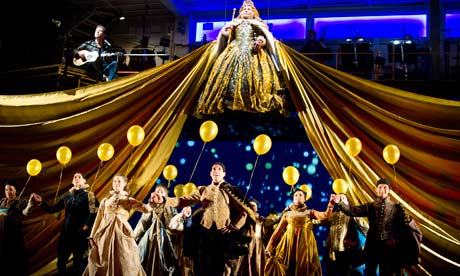
Since it was first seen during the Manchester festival last year, Damon Albarn and Rufus Norris's opera built around the life and work of John Dee – the 16th-century mathematician, alchemist, spy and adviser to Elizabeth I – has been fleshed out and revised. Extra songs have been added (Dr Dee himself has gained a singing voice), orchestrations enhanced and Norris's production generally refined. In its transfer to the Coliseum under English National Opera's auspices, Dr Dee seems to have lost its original subtitle, An English Opera, though the parade of national stereotypes in the opening minutes of Norris's lavish, hugely imaginative and energetic staging still underscores that aspect of the work and its focus on a particularly home-grown form of battiness.
Whether the changes have made it a more effective piece of music theatre than before, I can't say, but there is no doubt that significant problems remain. Albarn isn't by any means the first composer to concentrate on such an intriguing figure: Harrison Birtwistle, for instance, once seriously considered the subject, and Dee's language of the angels, Enochian, appears in his recent cantata Angel Fighter, while John Harle and David Pountney put together a not very successful music theatre piece, Angel Magick, on the subject in 1998. But for all his esoteric attraction, Dee remains a hard figure to pin down, and I'm not sure Albarn and Norris have really got to grips with his significance except in a superficial way.
It doesn't help one bit that the vast majority of their text is inaudible. Albarn's own series of songs fares well enough, but little of what the protagonists sing comes across at all. The amplification, of course, doesn't help either, and why this show should have been exempt from ENO's insistence on surtitles escapes me.
At times, what's going on in Norris's virtuoso parade of stage imagery (designed by Paul Atkinson) is hard to connect with the more or less chronological treatment of Dee's life in the printed synopsis. It sometimes seems more like an Einstein on the Beach-style contemplation of themes from Dee's life and work than any articulate attempt to trace it as a historical narrative or in terms of his relationships with the important figures in his life, from the queen down.
The best moments in the music come from the heterogeneous group of instruments, including kora, viols, recorders and hurdy-gurdy, suspended above the action; the amplified theorbo, sounding like some larger-than-life harp, is a particular delight. What comes from the pit orchestra, conducted by Stephen Higgins, makes much less impression. The stage performances, led by Paul Hilton's saturnine Dee, are striking – it's good to see counter-tenor Christopher Robson back on the Coliseum stage as the scryer Kelley, while Steven Page's bestilted Walsingham is a baleful presence and Anna Dennis is touching as Dee's daughter, Katherine. But it's largely thanks to Norris's production that it all just about sustains its two-hour span.

